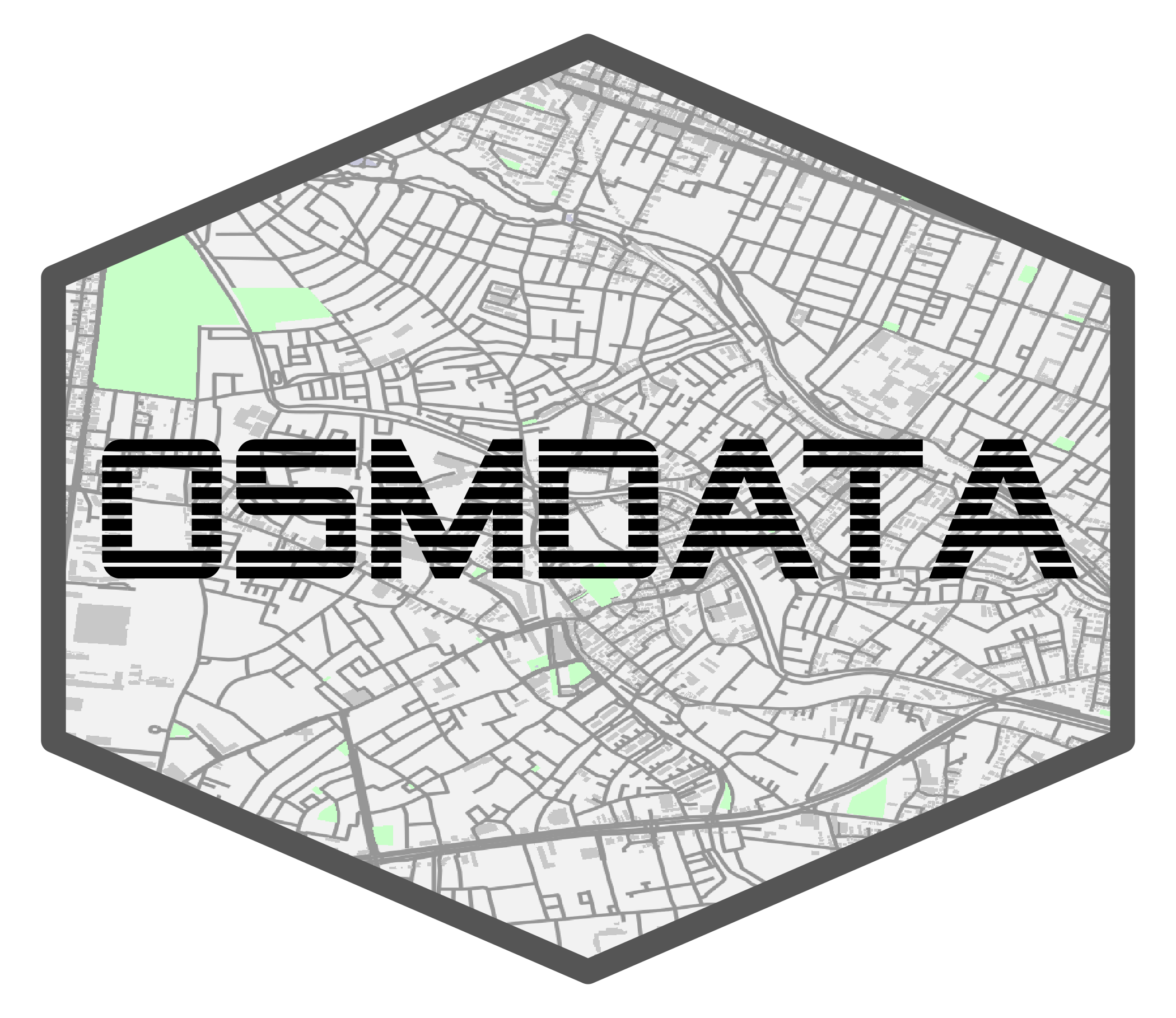osmdata is an R package for accessing the data underlying
OpenStreetMap (OSM), delivered via the Overpass
API. (Other packages
such as
OpenStreetMap
can be used to download raster tiles based on OSM data.)
Overpass is a read-only API that extracts
custom selected parts of OSM data. Data can be returned in a variety of
formats, including as Simple Features
(sf), Spatial
(sp), or Silicate
(sc) objects.
To install:
# Install from CRAN
install.packages("osmdata")
# Alternatively, install the development version
# install.packages("remotes")
remotes::install_github("ropensci/osmdata")To load the package and check the version:
library(osmdata)
#> Data (c) OpenStreetMap contributors, ODbL 1.0. https://www.openstreetmap.org/copyright
packageVersion("osmdata")
#> [1] '0.1.2'Overpass API queries
can be built from a base query constructed with opq followed by
add_osm_feature. The corresponding OSM objects are then downloaded and
converted to R Simple Features (sf) objects with
osmdata_sf() or to R Spatial (sp) objects with
osmdata_sp(). For example,
x <- opq(bbox = c(-0.27, 51.47, -0.20, 51.50)) %>% # Chiswick Eyot in London, U.K.
add_osm_feature(key = 'name', value = "Thames", value_exact = FALSE) %>%
osmdata_sf()
x#> Object of class 'osmdata' with:
#> $bbox : 51.47,-0.27,51.5,-0.2
#> $overpass_call : The call submitted to the overpass API
#> $meta : metadata including timestamp and version numbers
#> $osm_points : 'sf' Simple Features Collection with 24548 points
#> $osm_lines : 'sf' Simple Features Collection with 2219 linestrings
#> $osm_polygons : 'sf' Simple Features Collection with 33 polygons
#> $osm_multilines : 'sf' Simple Features Collection with 6 multilinestrings
#> $osm_multipolygons : 'sf' Simple Features Collection with 3 multipolygons
OSM data can also be downloaded in OSM XML format with osmdata_xml()
and saved for use with other software.
osmdata_xml(q1, "data.osm")All osmdata queries begin with a bounding box defining the area of the
query. The getbb()
function can be
used to extract bounding boxes for specified place names.
getbb ("astana kazakhstan")
#> min max
#> x 71.22444 71.78519
#> y 51.00068 51.35111The next step is to convert that to an overpass query object with the
opq()
function:
q <- opq (getbb ("astana kazakhstan"))
q <- opq ("astana kazakhstan") # identical resultIt is also possible to use bounding polygons rather than rectangular boxes:
b <- getbb ("bangalore", format_out = "polygon")
class (b); head (b [[1]])
#> [1] "matrix"
#> [1] 77.4601The next step is to define features of interest using the
add_osm_feature()
function.
This function accepts key and value parameters specifying desired
features in the OSM key-vale
schema. Multiple
add_osm_feature() calls may be combined as illustrated below, with the
result being a logical AND operation, thus returning all amenities that
are lebelled both as restaurants and also as pubs:
q <- opq ("portsmouth usa") %>%
add_osm_feature(key = "amenity", value = "restaurant") %>%
add_osm_feature(key = "amenity", value = "pub") # There are none of these(Logical OR combinations are demonstrated below.) Negation can also be specified by pre-prending an exclamation mark so that the following requests all amenities that are NOT labelled as restaurants and that are not labelled as pubs:
q <- opq ("portsmouth usa") %>%
add_osm_feature(key = "amenity", value = "!restaurant") %>%
add_osm_feature(key = "amenity", value = "!pub") # There are a lot of theseAdditional arguments allow for more refined matching, such as the following requrest for all pubs with “irish” in the name:
q <- opq ("washington dc") %>%
add_osm_feature(key = "amenity", value = "pub") %>%
add_osm_feature(key = "name", value = "irish",
value_exact = FALSE, match_case = FALSE)See
?available_features
and
?available_tags
for further information.
An overpass query constructed with the opq() and add_osm_feature()
functions is then sent to the overpass
server to request data. These data may be
returned in a variety of formats, currently including:
- XML data (downloaded locally) via
osmdata_xml(); - Simple Features (sf) format
via
osmdata_sf(); - R Spatial (sp) format via
osmdata_sp(); and - Silicate (SC) format via
osmdata_sc().
Logical OR combinations can be implemented with the package’s internal
c method, so that the above example can be extended to all amenities
that are either restaurants OR pubs with
pubs <- opq ("portsmouth usa") %>%
add_osm_feature(key = "amenity", value = "pub") %>%
osmdata_sf()
restaurants <- opq ("portsmouth usa") %>%
add_osm_feature(key = "amenity", value = "restaurant") %>%
osmdata_sf()
c (pubs, restaurants)#> Object of class 'osmdata' with:
#> $bbox : 43.0135509,-70.8229994,43.0996118,-70.7279298
#> $overpass_call : The call submitted to the overpass API
#> $meta : metadata including timestamp and version numbers
#> $osm_points : 'sf' Simple Features Collection with 325 points
#> $osm_lines : NULL
#> $osm_polygons : 'sf' Simple Features Collection with 24 polygons
#> $osm_multilines : NULL
#> $osm_multipolygons : NULL
Data may also be trimmed to within a defined polygonal shape with the
trim_osmdata()
function. Full package functionality is described on the
website
citation ("osmdata")
#>
#> To cite osmdata in publications use:
#>
#> Mark Padgham, Bob Rudis, Robin Lovelace, Maëlle Salmon (2017).
#> osmdata Journal of Open Source Software, 2(14). URL
#> https://doi.org/10.21105/joss.00305
#>
#> A BibTeX entry for LaTeX users is
#>
#> @Article{,
#> title = {osmdata},
#> author = {Mark Padgham and Bob Rudis and Robin Lovelace and Maëlle Salmon},
#> journal = {The Journal of Open Source Software},
#> year = {2017},
#> volume = {2},
#> number = {14},
#> month = {jun},
#> publisher = {The Open Journal},
#> url = {https://doi.org/10.21105/joss.00305},
#> doi = {10.21105/joss.00305},
#> }Please note that this project is released with a Contributor Code of Conduct. By participating in this project you agree to abide by its terms.

